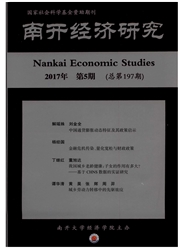

 中文摘要:
中文摘要:
本文通过在标准的IS-LM—BP模型中考虑跨境金融资产和负债这一影响货币需求的因素,构建了资本不完全流动、有管理的浮动汇率制下的两国宏观调控模型,并考察货币政策和财政政策的效应。研究发现,长期里,货币政策不具有真实效应,财政政策会影响真实汇率、利率和物价,但影响力度和方向则取决于货币需求的利率弹性等因素。短期内,财政政策的效应取决于挤出效应的大小;货币政策可通过降低利率达到促进经济增长的目的。境外金融资本的流入将引起本国货币需求增加,利率上涨、本币升值,总产出下降。金融资本的流出将通过减少投资支出、扩大出口的途径实现“调结构、促增长”的目标。
 英文摘要:
英文摘要:
We develop a two country model of monetary and fiscal policies under imperfect capital flow and managed floating exchange rate and discuss the effects of the policies by incorporating the net oversea assets that has an impact on the demand for money in the IS- LM-BP model. We find that monetary policies will not have the real effects, and fiscal poli- cies will have the effect on the real exchange rate, interest rate and price level in the long run, but the extent and directions of the effects depend on interest elasticity of demand for money and other factors. In the short run, the effects of fiscal policy depend on the crowding-out effects, and monetary policy has effect on real output through decreasing the interest rate. An increase of capital inflow will result in an increase in demand for money and interest rate, appreciation of local currency, and real output. In contrast, an increase of capital outflow will lead to decrease of capital expenditure and increase of export, and thus change the proportions of demand components.
 同期刊论文项目
同期刊论文项目
 同项目期刊论文
同项目期刊论文
 期刊信息
期刊信息
